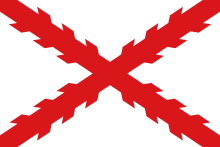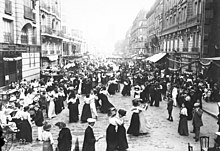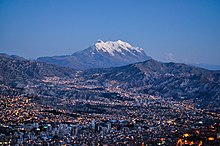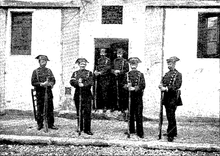Joan Bardina Castarà
[1] The youngest of them, Joan Bardina Savarich (died 1891),[2] left the family home early and in search of work settled in Sant Boi de Llobregat, a town at the outskirts of Barcelona.
She also came from a humble, though somewhat better positioned family; her parents, Josep Castarà Marigó and María Ciuró (originally Sigró) Puig, were handicraftsmen specializing in lace-making; especially the latter was recognized in the town.
Trying his hand in local journals, Bardina published a pamphlet deemed disrespectful towards the cardinal Sancha y Hervás;[12] he considered a heavy reprimand received unfair.
In 1895 he published first poems in the Carlist press,[31] signed with a histrionic pen-name "Valcarlos",[32] and kept contributing[33] to various Traditionalist titles;[34] his pieces featured belligerent tone and scarce maturity.
[37] The same year Bardina joined a newly launched[38] Carlist satirical weekly in Catalan, Lo Mestre Titas,[39] and quickly emerged as one of its key contributors.
[43] Bardina's contributions fell into 3 fields: lambasting Liberal governments, discussing political stand of the Church, and promoting Catalanism; he wrote poetry and essays.
[67] Support for historical territorial identities and for loose organization of state has been major component of the Carlist vision; initially it seemed that Bardina's view on the Catalan question was firmly anchored within this outlook.
[70] The only viable offer for Catalonia – Bardina argued - was this of Carlos VII, who already in the 1870s hailed Catalan identity and pledged to restore traditional regional establishments.
[72] By the turn of the centuries militant and zealous Bardina's tone gave way to somewhat moderated polemics, mostly with Enric Prat de la Riba; discussing differences of programs and contradictory positions of Carlism and nationalist Catalanism, he abandoned earlier venom.
[76] Though explicitly rejecting full political independence in favor of a self-government, his vision was mounted in a general, federal or confederal view of an Iberian peninsula as a conglomerate of kingdoms, principates, señorios and other entities.
[80] Though Carlism adopted an ambiguous position on the question of autonomy and though federative concepts were vaguely advanced by some key Carlist pundits, definitive and adamant stand of Bardina was barely acceptable for the party executives.
In the mid-1900s he was already within the “intellectuales orgánicos” circle of Prat de la Riba,[88] individuals staying clear of politics but engaged in ground-level work within the conservative, bourgeoisie Catalanism.
Starting mid-1900 Bardina was to engage in a variety of Catalanist educational initiatives, be it congresses, lectures, newspapers, schools, self-governmental or private institutions and various associations.
Apart from work as a private tutor in well-to-do Barcelona families[89] Bardina had no experience as to education, though he grew enthusiastic about the subject and befriended individuals from the scholarly realm; among them were the Giner de los Rios brothers, chief promoters of Krausism in Spain.
[93] At the time La Lliga attempted to re-format education system along Catalanist lines;[94] one of the instruments envisioned was Patronato de Escuelas, intended to supervise a network of Catalan schools for the working class.
Asked by Prat de la Riba to work on the document a few years earlier,[115] Bardina heavily contributed to its pedagogical section, mostly within the Krausist-Catalanist framework and occasionally assuming a somewhat anti-conservative flavor.
[124] In 1912 with some of his former alumni he moved to Paris to learn the French educational system, the stay financed initially with private money; having obtained public grant,[125] he then extended the mission to Belgium and Britain.
[141] In Valparaíso Bardina commenced teaching at Seminario San Rafael,[142] a very prestigious establishment set up by the local archbishop and aimed at modelling not only future priests, but also as a stepping stone towards a lay career.
In the 1920s he published numerous pieces, centered on education though at times dealing also with social and political issues;[144] set in the Catholic framework, they nevertheless kept advancing innovative views on schooling.
At unspecified time in the 1920s he commenced teaching at a customs officer training center, which proved to be a safe source of income and provided him with esteem of the civil servant.
The project proved hugely successful, with the review distributed in many American countries; it also consumed much of his time, as gathering information and establishing new links Bardina started to travel across the continent; his trips took him to Peru, Colombia, Venezuela, Argentina and Ecuador.
[146] As he maintained contacts with his former Barcelona editors, he kept re-issuing manuals written back in Spain; posing as an expert and hailed by friendly periodicals as “celebre Dr. Saimbraum”, one of the pen-names he assumed, Bardina used to recommend booklets of “Dra.
Initially sympathetic towards the Spanish Republic, he later started to view it as incapable of solving structural issues; following a period of hesitation, during the Civil War he tended to side with the Nationalists.
Holding a prestigious academic post, he enjoyed friendship with some highly positioned Chilean dignitaries, including the president of Chile, Carlos Ibañez del Campo; young people were turning to him when seeking jobs.
Later on he admitted influence of Torres, Rey, Bolívar, Ortega, Bartolomé, father Manjón, Ribera and Altamira,[182] which adds up to an amalgamate of innovators encompassing Escuelas del Ave María, technocrats, Liberals and heterodox from Institución Libre.
[183] The means was to reinvigorate and channel natural potential of students;[184] this in turn was to be achieved by focus on effort instead of result, on searching instead of absorbing, on satisfaction instead of awards/penalties and on co-operation instead of competition.
[195] Padre Manjón was suspected of excessive stress on rules and the followers of Spencer were criticized for chaotic “robinsonismo” in education;[196] a libertarian pedagogue Alexis Sluys found himself under particularly heavy fire for archaic concept, a clash perhaps related to Bardina's episode in Bolivia.
[197] Currently Bardina is counted among scholars forming l’Escola Nova,[198] a common term applied retroactively[199] to a number of Catalan educators who commenced activity in the late 19th century and consolidated in the 1920s.
[206] In the local Valparaíso realm he gained recognition as a press pundit; his academic role earned Bardina appreciation among the disciples, though he is not noted as an influential figure among Chilean scholars of law.
So far it remains unclear whether Bardina's textbooks on topics ranging from infantry tactics to grammar, self-defense, hygiene, savoir-vire and home-made confectionery are charlatanry[223] or rather useful contributions to popular education.


















